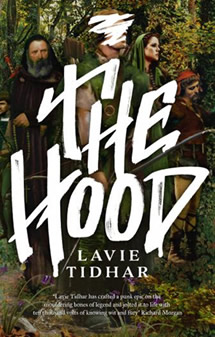Reviewed by Robert Goodman.
By Lavie Tidhar, Head of Zeus, $32.99.
 Award winning fantasy author turned Arthurian legend on its head in his bawdy, reverentially irreverent By Force Alone. It turned out that this was but the first in a series which Tidhar is calling the “Anti-Matter of Britain Quartet”. The Matter of Britain is a body of medieval literature containing famous tales and myths that are deep in the British psyche. So it comes as no surprise that the second book in the series, The Hood, takes on another dearly loved but mainly fictional British hero Robin Hood.
Award winning fantasy author turned Arthurian legend on its head in his bawdy, reverentially irreverent By Force Alone. It turned out that this was but the first in a series which Tidhar is calling the “Anti-Matter of Britain Quartet”. The Matter of Britain is a body of medieval literature containing famous tales and myths that are deep in the British psyche. So it comes as no surprise that the second book in the series, The Hood, takes on another dearly loved but mainly fictional British hero Robin Hood.
The structure of The Hood is much like that of By Force Alone. The book is made up of a number of short tales, mainly focussed on particular characters. But there is also a vague overarching plot that weaves in and out, sometimes more clearly than at others. Because the overall narrative is really one of mythmaking where the character of Robin Hood is played by any number of people over the years. One of the new characters that Tidhar introduces is a Jewish woman called Rebecca who starts off as a witches assistant, gets into the local drug trade and has her own adventures. But as is made clear in an encounter with the current Hood:
The Hood shrugs. “You are not important,” he tells her mercilessly. This is my story, not yours. The stories they sing are of Robin Hood, not of some Jewess in Nottingham or of some dying hedge witch who carried out abortions… I steal from the rich. I give to the poor. Hated by the bad, loved by the good. I am the Hood.”
Many of the stories do deal with characters with whom readers will think they are familiar – Alan a Dale, Friar Tuck, Little John and Will Scarlet – but Tidhar puts new twists on these familiar archetypes. A few are veterans from the crusades, one is on a journey of revenge. But if anything, these characters are even more familiar than those of the Arthurian tales, given the number of retellings of the Robin Hood legends through the twentieth century.
There are strong links to the first book in this series. The faerie world, which played a large part in Arthur’s story is still in play although the continued rise of Christianity is pushing it further into the background. But the thirst of faeries for power and their capacity to meddle in the real world is consistent. And there is a section which delves into some very well known faerie tales. All of which revolves around the mystical wood and Marian the Green Lady:
The wood is where humanity’s dreams and nightmares come from, and where they fled to shelter.
But as always there is the sense of fun that Tidhar has in playing in these worlds. His riffing not only on the stories themselves but on their connections to more modern tales. There is a long subplot that uses holy relics but builds them into a Frankenstein narrative. The comedic guards at the gates of Tidhar’s Nottingham are called Bert and Ernest. The list goes on. And then there is just the joyously profane narrative itself:
The point is, there is no one in charge. It’s an anarchy – from the Greek, a state without a ruler. So money talks and bullshit walks, as Pliny the Elder said.
Tidhar’s Anti-Matter of Britain series will not be for everyone. These narratives require readers to forget what they might know about these famous stories and look at them through fresh eyes. With The Hood Tidhar continues to both pay homage to those traditions but also to completely reinvent them for a modern audience. And continues to demonstrate why he is one of the most exciting and interesting fantasy authors working in the genre.
Over 750 more reviews can be found on Pile by the Bed.











